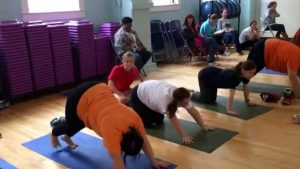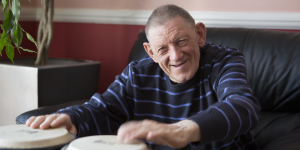Mindfulness Improves the Well-Being of The Caregivers of Children with Developmental Disabilities
By John M. de Castro, Ph.D.
“There are only four kinds of people in the world. Those who have been caregivers. Those who are currently caregivers. Those who will be caregivers, and those who will need a caregiver.” — Rosalyn Carter
Intellectual disabilities involve below average intelligence and relatively slow learning. They are quite common, affecting an estimated 10% of individuals worldwide. These disabilities present problems for the individual in learning mathematics, reading and writing. Individuals with intellectual disorders often have challenging behaviors including aggression, disruptive and socially inappropriate behaviors, self‐injury and withdrawal behaviors. The challenging behaviors not only reduce the quality of life of the individual but also puts them at higher risk of abuse, neglect, deprivation, institutionalization, and restraints. In addition, caregivers may have to deal with verbal and physical abuse. Obviously, there is a need for therapies that can reduce these behaviors. Mindfulness training may be useful. It has been shown to improve the behavior of individuals with intellectual disabilities and the well-being or their caregivers. So, there is a need to summarize what has been learned regarding the influence of mindfulness on the caregivers of children with developmental disabilities.
In today’s Research News article “The Effect of Mindfulness-Based and Acceptance Commitment Therapy-Based Interventions to Improve the Mental Well-Being Among Parents of Children with Developmental Disabilities: A Systematic Review and Meta-Analysis.” (See summary below or view the full text of the study at: https://www.ncbi.nlm.nih.gov/pmc/articles/PMC8237545/ ) Chua and Shorey review, summarize, and perform a meta-analysis of the published research on the influence of mindfulness on the caregivers of children with developmental disabilities.
They identified 10 published research studies that clearly demonstrate that mindfulness improves the well-being of the caregivers including improvements in anxiety, depression, and perceived stress. Importantly, these improvements would predict that the caregivers would be less likely to burnout and would provide better care for the children.
“My caregiver mantra is to remember: the only control you have is over the changes you choose to make.” — Nancy L. Kriseman
CMCS – Center for Mindfulness and Contemplative Studies
This and other Contemplative Studies posts are also available on Twitter @MindfulResearch
Study Summary
Chua JYX, Shorey S. The Effect of Mindfulness-Based and Acceptance Commitment Therapy-Based Interventions to Improve the Mental Well-Being Among Parents of Children with Developmental Disabilities: A Systematic Review and Meta-Analysis. J Autism Dev Disord. 2022 Jun;52(6):2770-2783. doi: 10.1007/s10803-021-04893-1. Epub 2021 Jun 28. PMID: 34181139; PMCID: PMC8237545.
Abstract
Parents of children with developmental disabilities are susceptible to mental health problems. Mindfulness-based and acceptance and commitment therapy (ACT)-based interventions can improve their mental well-being. This review examined the effectiveness of mindfulness-based and ACT-based interventions in improving mental well-being and mindfulness among parents of children with developmental disabilities. Six electronic databases were searched, resulting in the inclusion of ten studies published between 2014 and 2020. Meta-analysis was conducted using the random-effect model. The results suggest that mindfulness-based and ACT-based interventions were effective in decreasing parental stress, anxiety and depression, however, the effectiveness of these interventions in increasing parental mindfulness was inconclusive. Based on these findings, we discussed considerations for implementing interventions and identified areas which warrant further research.
https://www.ncbi.nlm.nih.gov/pmc/articles/PMC8237545/







